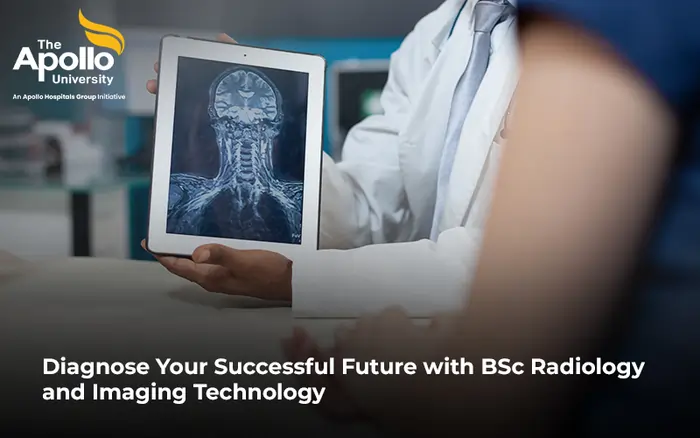

Your eyes are amazing, but what if you could see beyond the surface? Imagine peering into a living body, not with scalpels and stitches, but with beams of light and magnetic fields. That’s the world of BSc Radiology and Imaging Technology. BSc Radiology and Imaging Technology dives deep into the fascinating world of seeing what we can’t see with the naked eye. Imagine using cutting-edge technology to create detailed pictures of bones, organs, and even the tiniest blood vessels.
The programme isn’t just about fancy machines, though. It’s about becoming a medical artist, translating invisible health issues into clear images that doctors can use to heal. So, if you have a curious mind, a steady hand, and a desire to be part of the healthcare frontline, BSc Radiology and Imaging Technology might just be the missing piece in your puzzle. Do you find the field fascinating? Do you wish to know more details about it? Let’s begin with the eligibility first.
In this article
ToggleIn order to take admission to B.Sc. In the imaging technology, the candidate must fulfil the eligibility criteria. As per the common BSc Imaging Technology eligibility, candidates must have achieved a minimum of 45% in Intermediate (10+2) or equivalent, or 40% for reserved category candidates, with Botany, Zoology, Physics, and Chemistry.
Alternatively, they can have completed the Inter vocational course with a Bridge course in Biological and Physical Sciences, or have completed APOSS with Biological Sciences and Physical Sciences. Additionally, candidates must be 17 years old.
As imaging technology is applicable in many industries, its scope is excessively wide. The common industries where the BSc Radiology and Imaging Technology graduates are required are:
And more!
Students can easily find job opportunities in the field of B.Sc Medical Imaging Technology. They have the option to align their B.Sc Medical Imaging Technology course with their future goals, with career choices including Radiologists and Technicians.
The career options available for a B.Sc Medical Imaging Technology graduate are extensive and diverse, spanning across numerous areas and sectors. Below are a few of the common professions pursued by individuals who have completed their studies:
And more!
Pursuing a programme from a reputed institution is as important as pursuing a distinguished programme. The Apollo University offers a distinctive B.Sc. Imaging Technology Programme. Let’s examine the specifics.
The Apollo University is an esteemed university that strives to get students ready for the real world by offering a learning atmosphere that promotes hands-on experience, research, and life skills. The university’s programmes promote learning that occurs across different academic disciplines, hands-on experience in practice, knowledge implementation in the physical world, skills related to exchanging information and ideas, etc.
The 4-year B.Sc Imaging Technology progarmme, offered at the university, prepares students to use imaging technology for diagnosing different diseases and disorders in the human body. Furthermore, the course provides students with an understanding of how radiology and imaging technology are utilised in healthcare settings for accurate diagnosis of patients and illnesses.
The module aims to educate students in physics concerning radiology, radiographic and diagnostic imaging techniques, radiographic photography, and image processing. With the backing of the internationally renowned Apollo Group, the programme focuses on contemporary medical education to prepare students with the necessary knowledge, abilities and principles for a successful medical profession in the 21st century.
Guided by professors at the Teaching Hospital.
Focus on initiating contact with patients at an early stage.
Enhancement of analytical thinking abilities
Practice and education using simulations to improve communication abilities.
work ethic and conduct in a professional manner
Revolutionising student learning through innovative use of Technology-Enhanced Learning.
Evaluation and growth in one’s career.
BSc Imagin Technology is one of the most in-demand courses today. The programme transforms you into a medical investigator, utilising X-rays, MRIs, and various advanced technologies to explore the concealed realm within the human body.
The programme plays a crucial part in patient care, aiding doctors in diagnosing and treating illnesses with exceptional accuracy. Does the advancing healthcare system create a spark within you? Enrol now in BSc in Imaging Technology and make a real difference by contributing to improving patient outcomes with your expertise in medical imaging.
Students studying for a B.Sc in medical radiography and imaging technology have the opportunity to pursue careers as radiology technicians, radiology assistants, MRI technicians, CT technicians, CT specialists, and various other roles in radiology departments of hospitals and medical colleges.
There are vast career prospects in the Radiology field. Due to advancements in medical science and technologies, there is a higher need for radiographers. You have the chance to discover numerous job options in both public and private sectors that can lead to success in life.
There are numerous job options, including a radiology technician, radiology assistant, radiologist, radiographer, and ultrasound technician / diagnostic medical sonographer. MRI Technician, CT Scan Technologist, etc.
Are you prepared to discover the mysteries concealed beneath the surface? If yes, then discover the BSc in Radiology and Imaging Technology to find out if it sparks your interest in advancing healthcare through innovation!
The Apollo University is a private university.
The Apollo University is in Andhra Pradesh, India.
